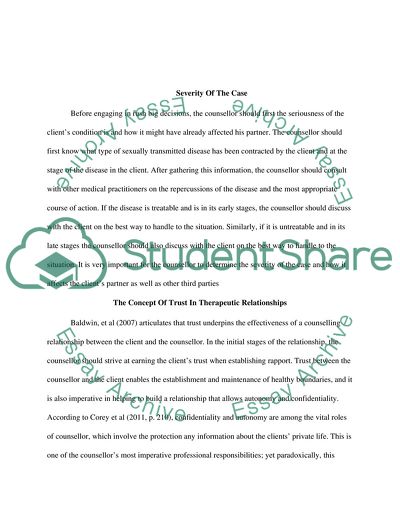Cite this document
(BACP Codes of Ethics Case Study Example | Topics and Well Written Essays - 2500 words, n.d.)
BACP Codes of Ethics Case Study Example | Topics and Well Written Essays - 2500 words. Retrieved from https://studentshare.org/psychology/1823713-informed-by-the-bacp-codes-of-ethics-discuss-the-factors-that-would-impinge-on-how-you-might-decide-to-move-forward-in-one-of-the-following-situations-my-client-has-contracted-a-sexual-disease-he-continues-to-engage-in-unsafe-sexual-practices-with-his-p
BACP Codes of Ethics Case Study Example | Topics and Well Written Essays - 2500 words. Retrieved from https://studentshare.org/psychology/1823713-informed-by-the-bacp-codes-of-ethics-discuss-the-factors-that-would-impinge-on-how-you-might-decide-to-move-forward-in-one-of-the-following-situations-my-client-has-contracted-a-sexual-disease-he-continues-to-engage-in-unsafe-sexual-practices-with-his-p
(BACP Codes of Ethics Case Study Example | Topics and Well Written Essays - 2500 Words)
BACP Codes of Ethics Case Study Example | Topics and Well Written Essays - 2500 Words. https://studentshare.org/psychology/1823713-informed-by-the-bacp-codes-of-ethics-discuss-the-factors-that-would-impinge-on-how-you-might-decide-to-move-forward-in-one-of-the-following-situations-my-client-has-contracted-a-sexual-disease-he-continues-to-engage-in-unsafe-sexual-practices-with-his-p.
BACP Codes of Ethics Case Study Example | Topics and Well Written Essays - 2500 Words. https://studentshare.org/psychology/1823713-informed-by-the-bacp-codes-of-ethics-discuss-the-factors-that-would-impinge-on-how-you-might-decide-to-move-forward-in-one-of-the-following-situations-my-client-has-contracted-a-sexual-disease-he-continues-to-engage-in-unsafe-sexual-practices-with-his-p.
“BACP Codes of Ethics Case Study Example | Topics and Well Written Essays - 2500 Words”. https://studentshare.org/psychology/1823713-informed-by-the-bacp-codes-of-ethics-discuss-the-factors-that-would-impinge-on-how-you-might-decide-to-move-forward-in-one-of-the-following-situations-my-client-has-contracted-a-sexual-disease-he-continues-to-engage-in-unsafe-sexual-practices-with-his-p.


